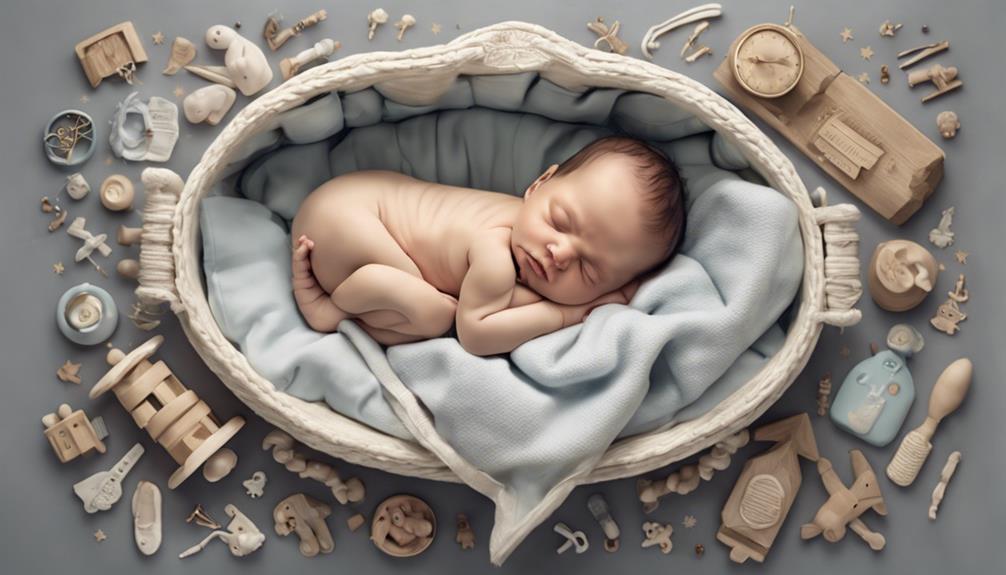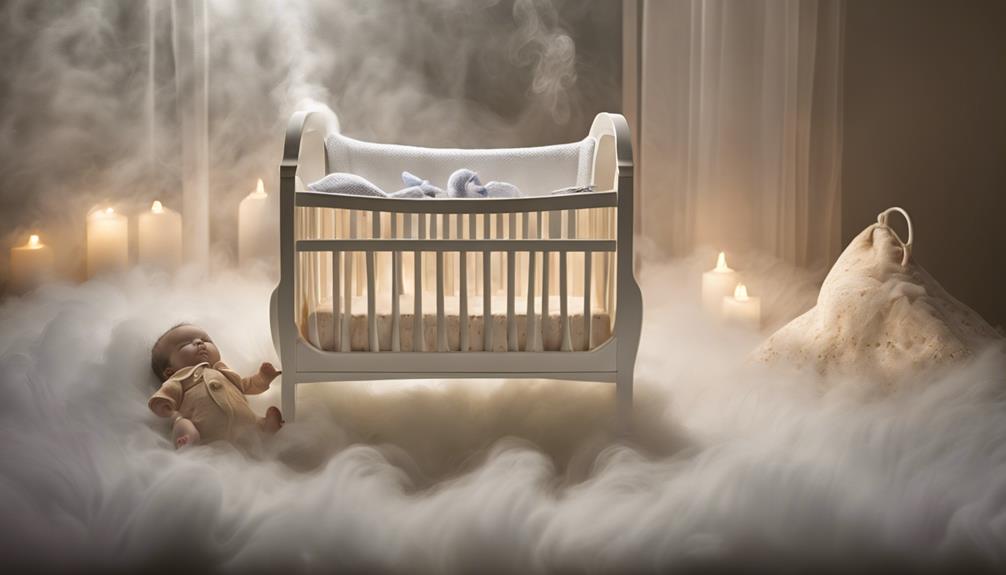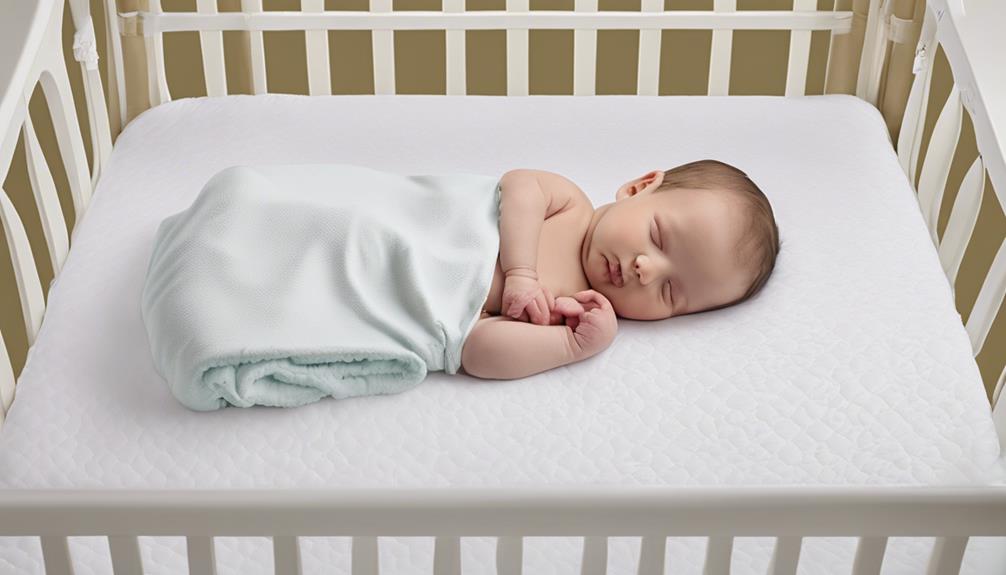As we explore the notion of how much sleep is too much for a newborn, one may wonder if there is a definitive answer to this common query. Understanding the delicate balance between adequate rest and potential concerns regarding excessive sleeping in newborns is important for parents and caregivers.
Let's investigate into the intricacies of newborn sleep patterns and uncover the signs that might indicate when a baby is sleeping more than necessary, shedding light on the importance of vigilant observation and proactive measures in ensuring the well-being of our little ones.
Key Takeaways
- Newborns typically need 14-17 hours of sleep daily for healthy development.
- Excessive sleep exceeding 19 hours or missing feedings can indicate underlying issues.
- Premature babies may require more sleep, but consistent oversleeping needs evaluation.
- Monitoring sleep patterns and seeking medical advice for consistent oversleeping are crucial for newborns.
Recommended Newborn Sleep Duration
Newborns typically require 14-17 hours of sleep per day to support their growth and development. This may seem like a lot, but it's essential for their well-being. Babies have small stomachs and need frequent feeding, which is why they tend to sleep in short intervals of 1-2 hours at a time. These patterns of waking and sleeping are normal and necessary for their growth.
Ensuring that your newborn gets enough sleep is essential for their overall health. During sleep, their bodies regulate important functions like temperature and immune system responses. Additionally, sleep is crucial for the release of growth hormones and the formation of neural connections in their developing brains.
Monitoring your baby's sleep throughout the day can help you understand their individual patterns and guarantee they're getting the rest they need. By paying attention to their sleep cues and creating a soothing bedtime routine, you can help your newborn establish healthy sleep habits from an early age.
Signs of Excessive Newborn Sleep

Excessive newborn sleep can sometimes raise concerns among parents, prompting them to observe for specific signs indicating a need for further evaluation. While babies need ample rest, sleeping excessively, exceeding 19 hours a day, or missing feedings can be worrisome.
If your baby is consistently difficult to wake for feedings, it might be a cause for concern. Additionally, sudden changes in sleeping patterns, especially if accompanied by symptoms of illness like fever or unusual lethargy, shouldn't be overlooked.
Growth spurts can also lead to increased sleep, but if coupled with decreased feeding, it could signal an issue. Babies should generally wake up to feed every 2-3 hours. If you notice your newborn deviating significantly from these norms, seeking medical advice is advisable.
Factors Contributing to Newborn Oversleeping

Premature babies, in particular, may require increased amounts of sleep to support their growth and development, which can contribute to newborn oversleeping. While adequate rest is essential for a baby's overall well-being, excessive sleep in newborns could potentially indicate underlying medical issues. Oversleeping might impede a baby's ability to stay alert for essential activities such as feeding, hindering their growth and development.
It's important for newborns to be awake for feeding and bonding, as these interactions are important for their overall health and development. If a newborn consistently sleeps more than 20 hours a day, it may raise concerns and warrant a discussion with a healthcare provider. Monitoring a baby's sleep patterns is important to make sure they're getting the right balance of rest and wakefulness for the best growth, development, and overall health.
Monitoring Newborn Sleep Patterns

Monitoring a newborn's sleep patterns is important for ensuring they're getting the right balance of rest and wakefulness for best growth, development, and overall health. It's vital to keep an eye on the number of hours your newborn is sleeping per day to confirm they're thriving as they should.
Here are some key points to bear in mind when monitoring your newborn's sleep patterns:
- Newborns can sleep up to 22 hours initially, decreasing to 20 hours within weeks.
- By four months, babies should sleep 17 hours or less per day.
- Concern arises if a newborn sleeps more than six to eight hours at a stretch.
- Consistently sleeping more than 20 hours a day may be a cause for concern.
- If a newborn sleeps more than 18 hours a day without waking for feeding, consult a pediatrician.
Addressing Newborn Oversleeping

To address concerns about a newborn's oversleeping, it's important to observe their sleep patterns and behaviors closely. While newborns typically sleep 14 to 17 hours a day, excessive sleep could indicate underlying health issues or growth spurts. Premature babies might require even more sleep to support their development adequately.
If you find your newborn is sleeping too much and struggling to stay alert for feedings or bonding, it's critical to remain vigilant. The American Academy of Pediatrics recommends consulting a pediatrician if your newborn consistently sleeps more than 20 hours a day. Babies need their sleep, but it's also vital to make sure they're awake enough to feed and interact with you.
Frequently Asked Questions
How Much Sleep Is OK for Newborn?
I comprehend the concern about newborn sleep. Typically, 14 to 17 hours daily is normal, but exceeding 19 hours may warrant attention. Trust your instincts. If worried, consult a pediatrician. Your baby's health and well-being matter most.
Is It Normal for My Newborn to Sleep 20 Hours a Day?
It's common for newborns to sleep up to 20 hours a day. As they grow, this typically lessens. If your newborn consistently sleeps more than 20 hours, consulting a pediatrician is wise for guidance and reassurance.
Can You Let Newborn Sleep for 5 Hours?
Yes, we can let a newborn sleep for 5 hours, but it's important to balance sleep with feeding. Waking every 3-4 hours for nutrition supports growth. Extended sleep without feeding can affect development. Consult a pediatrician for guidance.
Why Is My 1 Month Old Sleeping so Much All of a Sudden?
We acknowledge your concern about your 1-month-old sleeping a lot suddenly. It's common for babies to go through growth spurts and developmental leaps, leading to increased rest. If worried, consulting a healthcare provider is important.
Conclusion
So, if your little one is snoozing like a sloth on a lazy Sunday, don't panic just yet. Keep an eye on their sleep patterns, but remember, babies are like tiny beings with their own unique quirks.
If you have concerns, reach out to your healthcare provider for guidance. And hey, who knows, maybe your newborn is just prepping for a future career as a professional napper!
Stay vigilant, but also embrace the cuteness of those extra zzz's.









